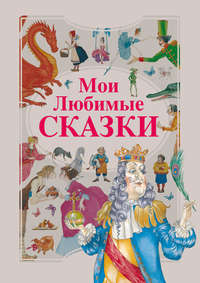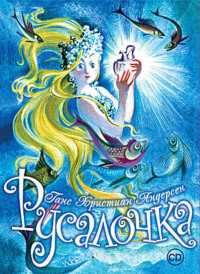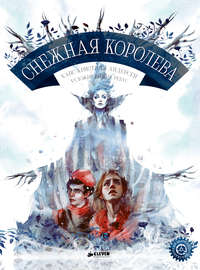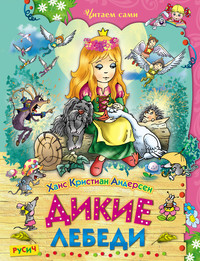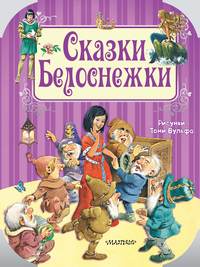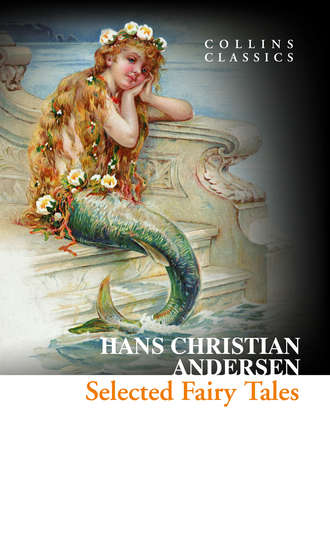
Полная версия
Selected Fairy Tales
The glaciers appear as if a rushing stream had been frozen in its course, and pressed into blocks of green crystal, which, balanced one upon another, form a wondrous palace of crystal for the Ice Maiden—the queen of the glaciers. It is she whose mighty power can crush the traveller to death, and arrest the flowing river in its course. She is also a child of the air, and with the swiftness of the chamois she can reach the snow-covered mountain tops, where the boldest mountaineer has to cut footsteps in the ice to ascend. She will sail on a frail pine-twig over the raging torrents beneath, and spring lightly from one iceberg to another, with her long, snow-white hair flowing around her, and her dark-green robe glittering like the waters of the deep Swiss lakes. “Mine is the power to seize and crush,” she cried. “Once a beautiful boy was stolen from me by man,—a boy whom I had kissed, but had not kissed to death. He is again among mankind, and tends the goats on the mountains. He is always climbing higher and higher, far away from all others, but not from me. He is mine; I will send for him.” And she gave Vertigo the commission.
It was summer, and the Ice Maiden was melting amidst the green verdure, when Vertigo swung himself up and down. Vertigo has many brothers, quite a troop of them, and the Ice Maiden chose the strongest among them. They exercise their power in different ways, and everywhere. Some sit on the banisters of steep stairs, others on the outer rails of lofty towers, or spring like squirrels along the ridges of the mountains. Others tread the air as a swimmer treads the water, and lure their victims here and there till they fall into the deep abyss. Vertigo and the Ice Maiden clutch at human beings, as the polypus seizes upon all that comes within its reach. And now Vertigo was to seize Rudy.
“Seize him, indeed,” cried Vertigo; “I cannot do it. That monster of a cat has taught him her tricks. That child of the human race has a power within him which keeps me at a distance; I cannot possibly reach the boy when he hangs from the branches of trees, over the precipice; or I would gladly tickle his feet, and send him heels over head through the air; but I cannot accomplish it.”
“We must accomplish it,” said the Ice Maiden; “either you or I must; and I will—I will!”
“No, no!” sounded through the air, like an echo on the mountain church bells chime. It was an answer in song, in the melting tones of a chorus from others of nature’s spirits—good and loving spirits, the daughters of the sunbeam. They who place themselves in a circle every evening on the mountain peaks; there they spread out their rose-coloured wings, which, as the sun sinks, become more flaming red, until the lofty Alps seem to burn with fire. Men call this the Alpine glow. After the sun has set, they disappear within the white snow on the mountain-tops, and slumber there till sunrise, when they again come forth. They have great love for flowers, for butterflies, and for mankind; and from among the latter they had chosen little Rudy. “You shall not catch him; you shall not seize him!” they sang.
“Greater and stronger than he have I seized!” said the Ice Maiden.
Then the daughters of the sun sang a song of the traveller, whose cloak had been carried away by the wind. “The wind took the covering, but not the man; it could even seize upon him, but not hold him fast. The children of strength are more powerful, more ethereal, even than we are. They can rise higher than our parent, the sun. They have the magic words that rule the wind and the waves, and compel them to serve and obey; and they can, at last, cast off the heavy, oppressive weight of mortality, and soar upwards.” Thus sweetly sounded the bell-like tones of the chorus.
And each morning the sun’s rays shone through the one little window of the grandfather’s house upon the quiet child. The daughters of the sunbeam kissed him; they wished to thaw, and melt, and obliterate the ice kiss which the queenly maiden of the glaciers had given him as he lay in the lap of his dead mother, in the deep crevasse of ice from which he had been so wonderfully rescued.
II. The Journey to the New Home
Rudy was just eight years old, when his uncle, who lived on the other side of the mountain, wished to have the boy, as he thought he might obtain a better education with him, and learn something more. His grandfather thought the same, so he consented to let him go. Rudy had many to say farewell to, as well as his grandfather. First, there was Ajola, the old dog.
“Your father was the postilion, and I was the postilion’s dog,” said Ajola. “We have often travelled the same journey together; I knew all the dogs and men on this side of the mountain. It is not my habit to talk much; but now that we have so little time to converse together, I will say something more than usual. I will relate to you a story, which I have reflected upon for a long time. I do not understand it, and very likely you will not, but that is of no consequence. I have, however, learnt from it that in this world things are not equally divided, neither for dogs nor for men. All are not born to lie on the lap and to drink milk: I have never been petted in this way, but I have seen a little dog seated in the place of a gentleman or lady, and travelling inside a post-chaise. The lady, who was his mistress, or of whom he was master, carried a bottle of milk, of which the little dog now and then drank; she also offered him pieces of sugar to crunch. He sniffed at them proudly, but would not eat one, so she ate them herself. I was running along the dirty road by the side of the carriage as hungry as a dog could be, chewing the cud of my own thoughts, which were rather in confusion. But many other things seemed in confusion also. Why was not I lying on a lap and travelling in a coach? I could not tell; yet I knew I could not alter my own condition, either by barking or growling.”
This was Ajola’s farewell speech, and Rudy threw his arms round the dog’s neck and kissed his cold nose. Then he took the cat in his arms, but he struggled to get free.
“You are getting too strong for me,” he said; “but I will not use my claws against you. Clamber away over the mountains; it was I who taught you to climb. Do not fancy you are going to fall, and you will be quite safe.” Then the cat jumped down and ran away; he did not wish Rudy to see that there were tears in his eyes.
The hens were hopping about the floor; one of them had no tail; a traveller, who fancied himself a sportsman, had shot off her tail, he had mistaken her for a bird of prey.
“Rudy is going away over the mountains,” said one of the hens.
“He is always in such a hurry,” said the other; “and I don’t like taking leave,” so they both hopped out.
But the goats said farewell; they bleated and wanted to go with him, they were so very sorry.
Just at this time two clever guides were going to cross the mountains to the other side of the Gemmi, and Rudy was to go with them on foot. It was a long walk for such a little boy, but he had plenty of strength and invincible courage. The swallows flew with him a little way, singing, “We and you—you and we.” The way led across the rushing Lutschine, which falls in numerous streams from the dark clefts of the Grindelwald glaciers. Trunks of fallen trees and blocks of stone form bridges over these streams. After passing a forest of alders, they began to ascend, passing by some blocks of ice that had loosened themselves from the side of the mountain and lay across their path; they had to step over these ice-blocks or walk round them. Rudy crept here and ran there, his eyes sparkling with joy, and he stepped so firmly with his iron-tipped mountain shoe, that he left a mark behind him wherever he placed his foot.
The earth was black where the mountain torrents or the melted ice had poured upon it, but the bluish green, glassy ice sparkled and glittered. They had to go round little pools, like lakes, enclosed between large masses of ice; and, while thus wandering out of their path, they came near an immense stone, which lay balanced on the edge of an icy peak. The stone lost its balance just as they reached it, and rolled over into the abyss beneath, while the noise of its fall was echoed back from every hollow cliff of the glaciers.
They were always going upwards. The glaciers seemed to spread above them like a continued chain of masses of ice, piled up in wild confusion between bare and rugged rocks. Rudy thought for a moment of what had been told him, that he and his mother had once lain buried in one of these cold, heart-chilling fissures; but he soon banished such thoughts, and looked upon the story as fabulous, like many other stories which had been told him. Once or twice, when the men thought the way was rather difficult for such a little boy, they held out their hands to assist him; but he would not accept their assistance, for he stood on the slippery ice as firmly as if he had been a chamois. They came at length to rocky ground; sometimes stepping upon moss-covered stones, sometimes passing beneath stunted fir-trees, and again through green meadows. The landscape was always changing, but ever above them towered the lofty snow-clad mountains, whose names not only Rudy but every other child knew—“The Jungfrau,” “The Monk and the Eiger.”
Rudy had never been so far away before; he had never trodden on the wide-spreading ocean of snow that lay here with its immovable billows, from which the wind blows off the snowflake now and then, as it cuts the foam from the waves of the sea. The glaciers stand here so close together it might almost be said they are hand-in-hand; and each is a crystal palace for the Ice Maiden, whose power and will it is to seize and imprison the unwary traveller.
The sun shone warmly, and the snow sparkled as if covered with glittering diamonds. Numerous insects, especially butterflies and bees, lay dead in heaps on the snow. They had ventured too high, or the wind had carried them here and left them to die of cold.
Around the Wetterhorn hung a feathery cloud, like a woolbag, and a threatening cloud too, for as it sunk lower it increased in size, and concealed within was a “fohn,” fearful in its violence should it break loose. This journey, with its varied incidents,—the wild paths, the night passed on the mountain, the steep rocky precipices, the hollow clefts, in which the rustling waters from time immemorial had worn away passages for themselves through blocks of stone,—all these were firmly impressed on Rudy’s memory.
In a forsaken stone building, which stood just beyond the seas of snow, they one night took shelter. Here they found some charcoal and pine branches, so that they soon made a fire. They arranged couches to lie on as well as they could, and then the men seated themselves by the fire, took out their pipes, and began to smoke. They also prepared a warm, spiced drink, of which they partook and Rudy was not forgotten—he had his share. Then they began to talk of those mysterious beings with which the land of the Alps abounds; the hosts of apparitions which come in the night, and carry off the sleepers through the air, to the wonderful floating town of Venice; of the wild herds-man, who drives the black sheep across the meadows. These flocks are never seen, yet the tinkle of their little bells has often been heard, as well as their unearthly bleating. Rudy listened eagerly, but without fear, for he knew not what fear meant; and while he listened, he fancied he could hear the roaring of the spectral herd. It seemed to come nearer and roar louder, till the men heard it also and listened in silence, till, at length, they told Rudy that he must not dare to sleep. It was a “fohn,” that violent storm-wind which rushes from the mountain to the valley beneath, and in its fury snaps asunder the trunks of large trees as if they were but slender reeds, and carries the wooden houses from one side of a river to the other as easily as we could move the pieces on a chess-board. After an hour had passed, they told Rudy that it was all over, and he might go to sleep; and, fatigued with his long walk, he readily slept at the word of command.
Very early the following morning they again set out. The sun on this day lighted up for Rudy new mountains, new glaciers, and new snow-fields. They had entered the Canton Valais, and found themselves on the ridge of the hills which can be seen from Grindelwald; but he was still far from his new home. They pointed out to him other clefts, other meadows, other woods and rocky paths, and other houses. Strange men made their appearance before him, and what men! They were misshapen, wretched-looking creatures, with yellow complexions; and on their necks were dark, ugly lumps of flesh, hanging down like bags. They were called cretins. They dragged themselves along painfully, and stared at the strangers with vacant eyes. The women looked more dreadful than the men. Poor Rudy! were these the sort of people he should see at his new home?
III. The Uncle
Rudy arrived at last at his uncle’s house, and was thankful to find the people like those he had been accustomed to see. There was only one cretin amongst them, a poor idiot boy, one of those unfortunate beings who, in their neglected conditions, go from house to house, and are received and taken care of in different families, for a month or two at a time.
Poor Saperli had just arrived at his uncle’s house when Rudy came. The uncle was an experienced hunter; he also followed the trade of a cooper; his wife was a lively little person, with a face like a bird, eyes like those of an eagle, and a long, hairy throat. Everything was new to Rudy—the fashion of the dress, the manners, the employments, and even the language; but the latter his childish ear would soon learn. He saw also that there was more wealth here, when compared with his former home at his grandfather’s. The rooms were larger, the walls were adorned with the horns of the chamois, and brightly polished guns. Over the door hung a painting of the Virgin Mary, fresh alpine roses and a burning lamp stood near it. Rudy’s uncle was, as we have said, one of the most noted chamois hunters in the whole district, and also one of the best guides. Rudy soon became the pet of the house; but there was another pet, an old hound, blind and lazy, who would never more follow the hunt, well as he had once done so. But his former good qualities were not forgotten, and therefore the animal was kept in the family and treated with every indulgence. Rudy stroked the old hound, but he did not like strangers, and Rudy was as yet a stranger; he did not, however, long remain so, he soon endeared himself to every heart, and became like one of the family.
“We are not very badly off, here in the canton Valais,” said his uncle one day; “we have the chamois, they do not die so fast as the wild goats, and it is certainly much better here now than in former times. How highly the old times have been spoken of, but ours is better. The bag has been opened, and a current of air now blows through our once confined valley. Something better always makes its appearance when old, worn-out things fail.”
When his uncle became communicative, he would relate stories of his youthful days, and further back still of the warlike times in which his father had lived. Valais was then, as he expressed it, only a closed-up bag, quite full of sick people, miserable cretins; but the French soldiers came, and they were capital doctors, they soon killed the disease and the sick people, too. The French people knew how to fight in more ways than one, and the girls knew how to conquer too; and when he said this the uncle nodded at his wife, who was a French woman by birth, and laughed. The French could also do battle on the stones. “It was they who cut a road out of the solid rock over the Simplon—such a road, that I need only say to a child of three years old, ‘Go down to Italy, you have only to keep in the high road,’ and the child will soon arrive in Italy, if he followed my directions.”
Then the uncle sang a French song, and cried, “Hurrah! long live Napoleon Buonaparte.” This was the first time Rudy had ever heard of France, or of Lyons, that great city on the Rhone where his uncle had once lived. His uncle said that Rudy, in a very few years, would become a clever hunter, he had quite a talent for it; he taught the boy to hold a gun properly, and to load and fire it. In the hunting season he took him to the hills, and made him drink the warm blood of the chamois, which is said to prevent the hunter from becoming giddy; he taught him to know the time when, from the different mountains, the avalanche is likely to fall, namely, at noontide or in the evening, from the effects of the sun’s rays; he made him observe the movements of the chamois when he gave a leap, so that he might fall firmly and lightly on his feet. He told him that when on the fissures of the rocks he could find no place for his feet, he must support himself on his elbows, and cling with his legs, and even lean firmly with his back, for this could be done when necessary. He told him also that the chamois are very cunning, they place lookers-out on the watch; but the hunter must be more cunning than they are, and find them out by the scent.
One day, when Rudy went out hunting with his uncle, he hung a coat and hat on an alpine staff, and the chamois mistook it for a man, as they generally do. The mountain path was narrow here; indeed it was scarcely a path at all, only a kind of shelf, close to the yawning abyss. The snow that lay upon it was partially thawed, and the stones crumbled beneath the feet. Every fragment of stone broken off struck the sides of the rock in its fall, till it rolled into the depths beneath, and sunk to rest. Upon this shelf Rudy’s uncle laid himself down, and crept forwards. At about a hundred paces behind him stood Rudy, upon the highest point of the rock, watching a great vulture hovering in the air; with a single stroke of his wing the bird might easily cast the creeping hunter into the abyss beneath, and make him his prey. Rudy’s uncle had eyes for nothing but the chamois, who, with its young kid, had just appeared round the edge of the rock. So Rudy kept his eyes fixed on the bird, he knew well what the great creature wanted; therefore he stood in readiness to discharge his gun at the proper moment. Suddenly the chamois made a spring, and his uncle fired and struck the animal with the deadly bullet; while the young kid rushed away, as if for a long life he had been accustomed to danger and practised flight. The large bird, alarmed at the report of the gun, wheeled off in another direction, and Rudy’s uncle was saved from danger, of which he knew nothing till he was told of it by the boy.
While they were both in pleasant mood, wending their way homewards, and the uncle whistling the tune of a song he had learnt in his young days, they suddenly heard a peculiar sound which seemed to come from the top of the mountain. They looked up, and saw above them, on the over-hanging rock, the snow-covering heave and lift itself as a piece of linen stretched on the ground to dry raises itself when the wind creeps under it. Smooth as polished marble slabs, the waves of snow cracked and loosened themselves, and then suddenly, with the rumbling noise of distant thunder, fell like a foaming cataract into the abyss. An avalanche had fallen, not upon Rudy and his uncle, but very near them. Alas, a great deal too near!
“Hold fast, Rudy!” cried his uncle; “hold fast, with all your might.”
Then Rudy clung with his arms to the trunk of the nearest tree, while his uncle climbed above him, and held fast by the branches. The avalanche rolled past them at some distance; but the gust of wind that followed, like the storm-wings of the avalanche, snapped asunder the trees and bushes over which it swept, as if they had been but dry rushes, and threw them about in every direction. The tree to which Rudy clung was thus overthrown, and Rudy dashed to the ground. The higher branches were snapped off, and carried away to a great distance; and among these shattered branches lay Rudy’s uncle, with his skull fractured. When they found him, his hand was still warm; but it would have been impossible to recognize his face. Rudy stood by, pale and trembling; it was the first shock of his life, the first time he had ever felt fear. Late in the evening he returned home with the fatal news,—to that home which was now to be so full of sorrow. His uncle’s wife uttered not a word, nor shed a tear, till the corpse was brought in; then her agony burst forth. The poor cretin crept away to his bed, and nothing was seen of him during the whole of the following day. Towards evening, however, he came to Rudy, and said, “Will you write a letter for me? Saperli cannot write; Saperli can only take the letters to the post.”
“A letter for you!” said Rudy; “who do you wish to write to?”
“To the Lord Christ,” he replied.
“What do you mean?” asked Rudy.
Then the poor idiot, as the cretin was often called, looked at Rudy with a most touching expression in his eyes, clasped his hands, and said, solemnly and devoutly, “Saperli wants to send a letter to Jesus Christ, to pray Him to let Saperli die, and not the master of the house here.”
Rudy pressed his hand, and replied, “A letter would not reach Him up above; it would not give him back whom we have lost.”
It was not, however, easy for Rudy to convince Saperli of the impossibility of doing what he wished.
“Now you must work for us,” said his foster-mother; and Rudy very soon became the entire support of the house.
IV. Babette
Who was the best marksman in the canton Valais? The chamois knew well. “Save yourselves from Rudy,” they might well say. And who is the handsomest marksman? “Oh, it is Rudy,” said the maidens; but they did not say, “Save yourselves from Rudy.” Neither did anxious mothers say so; for he bowed to them as pleasantly as to the young girls. He was so brave and cheerful. His cheeks were brown, his teeth white, and his eyes dark and sparkling. He was now a handsome young man of twenty years. The most icy water could not deter him from swimming; he could twist and turn like a fish. None could climb like he, and he clung as firmly to the edges of the rocks as a limpet. He had strong muscular power, as could be seen when he leapt from rock to rock. He had learnt this first from the cat, and more lately from the chamois. Rudy was considered the best guide over the mountains; every one had great confidence in him. He might have made a great deal of money as guide. His uncle had also taught him the trade of a cooper; but he had no inclination for either; his delight was in chamois-hunting, which also brought him plenty of money. Rudy would be a very good match, as people said, if he would not look above his own station. He was also such a famous partner in dancing, that the girls often dreamt about him, and one and another thought of him even when awake.
“He kissed me in the dance,” said Annette, the schoolmaster’s daughter, to her dearest friend; but she ought not to have told this, even to her dearest friend. It is not easy to keep such secrets; they are like sand in a sieve; they slip out. It was therefore soon known that Rudy, so brave and so good as he was, had kissed some one while dancing, and yet he had never kissed her who was dearest to him.
“Ah, ah,” said an old hunter, “he has kissed Annette, has he? he has begun with A, and I suppose he will kiss through the whole alphabet.”
But a kiss in the dance was all the busy tongues could accuse him of. He certainly had kissed Annette, but she was not the flower of his heart.
Down in the valley, near Bex, among the great walnut-trees, by the side of a little rushing mountain-stream, lived a rich miller. His dwelling-house was a large building, three storeys high, with little turrets. The roof was covered with chips, bound together with tin plates, that glittered in sunshine and in the moonlight. The largest of the turrets had a weather-cock, representing an apple pierced by a glittering arrow, in memory of William Tell. The mill was a neat and well-ordered place, that allowed itself to be sketched and written about; but the miller’s daughter did not permit any to sketch or write about her. So, at least, Rudy would have said, for her image was pictured in his heart; her eyes shone in it so brightly, that quite a flame had been kindled there; and, like all other fires, it had burst forth so suddenly, that the miller’s daughter, the beautiful Babette, was quite unaware of it. Rudy had never spoken a word to her on the subject. The miller was rich, and, on that account, Babette stood very high, and was rather difficult to aspire to. But said Rudy to himself, “Nothing is too high for a man to reach: he must climb with confidence in himself, and he will not fail.” He had learnt this lesson in his youthful home.


